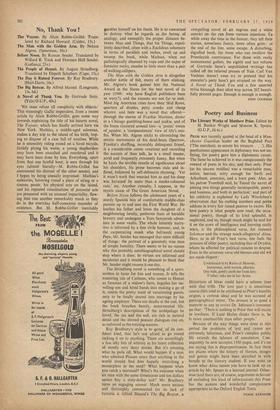Poetry and Business
The Literary Works of Matthew Prior. Edited by H. Bunker Wright and Monroe K. Spears. (O.U.P., £6 6s.)
PRIOR was recently quoted at the head of a Man- chester Guardian leader on the Baghdad Pact (The merchant, to secure his treasure . . .'). His posthumous appearance in diplomacy was not un- fitting, for poetry gave him a diplomatic career. The fame he achieved in it was conspicuously the reward of poets in his day, and then only. Prior (as his success testifies) was a remarkable man, active, learned, witty enough for Swift and Arbuthnot, amorous, and a born poet. Also, as his patron Trumbull said, he 'found the secret of joining two things generally incompatible, poetry and business, and both in perfection'; and part of his celebrity is explained by Lady Winchilsea's observation that his melting numbers and polite address in every fair raised passion to excess. His love poetry is what people now read; the occa- sional poetry, though of its kind splendid, is neglected, and so, though much might be said for it on the scare of intelligence and learning easily worn, is the philosophical verse, for instance Solomon and the strange mock-allegorical Alma. Here, as in all Prior's best verse, one feels the pressure of older poetry, including that of Dryden, whbm he affected for political reasons to despise. Even in the amorous verse old themes and old wit are made elegant :
Undebauch'd by Rules of Honour, Innocence, with nature, charms; One bids, gently push me from her; T'other, take me in her Arms.
Historians of Ideas could have a solemn time with that trifle. The love poet -y is sometimes coarse (this used to be attributed to Prior's humble origins, a curious idea) and he was accused of pornographical intent. The present is as good a moment as any to revive Dr. Johnson's comment on that : 'There is nothing in Prior that will excite to lewdness. If Lord Hailes thinks there is, he is more combustible than other people.'
Because of the way things were done at this period the problems of text and canon are extremely laborious, and Prior's complex public life extends the labours of annotation. Con- sequently he now occupies 1100 pages, and it's no use saying this is disproportionate. In fact there are places where the history of themes, images and genres might have been sketched in with benefit to the literary student. If you want to know what Alma means you have to look up an article by Mr. Spears in a learned journal. Other- wise (and there are, of course, arguments in favour of excluding this kind of information) this Prior has the austere and wonderful completeness appropriate to the Oxford English Texts.
FRANK KERMODS


































 Previous page
Previous page